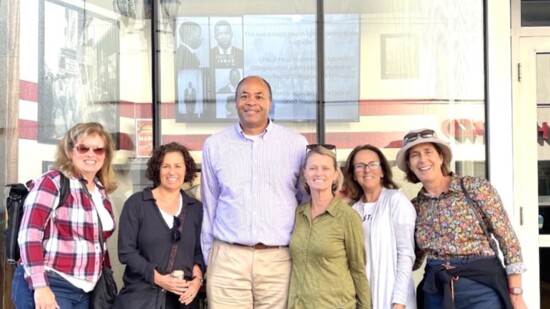David Steele Ewing is a well-known historian and Nashville native. He is a memorabilia collector, history consultant and proprietor of the popular Instagram account, TheNashvilleIWishIKnew.
What is the inspiration behind your Instagram account?
Instagram is a wonderful tool to tell the story of our city. I started it in 2016 because I was frustrated we didn’t have a Nashville history museum, so it would be my virtual history museum. The name, The Nashville I Wish I Knew, is taken from Jack Norman’s book, The Nashville I Knew. He grew up in the 20s and 30s and reminisces about buying penny candy at The Arcade and watching matinees at the Tennessee Theatre. There are lots of stories I like but that are not from my generation, so I called it The Nashville I Wish I Knew.
What are some other ways you help tell the story of Nashville?
I give private tours, mostly for business groups. I have about 50 different tours, ranging from Elvis to rock ’n’ roll, to Native American history. I also create custom tours, such as one I did about Bob Dylan. I recently gave tours of Franklin; one was a traditional Civil War tour and the other was from the perspective of African American soldiers.
I also work with companies, developers and hotels to research and tell the story of their buildings, neighborhoods or families. I find old photographs or memorabilia related to that business.
Where do you find memorabilia and what are the highlights of your personal collection?
I hunt everywhere: estate sales, flea markets, yard sales, auctions and antique stores. And dealers often call me. I hope one day I can fill up a Nashville history museum with things I’ve collected over the years.
I have the largest collection of things from the Tennessee Centennial Exposition of 1897, which was our World’s Fair. A lot of it is on display at the Parthenon right now. And the Country Music Hall of Fame and Museum is doing a 20-year look back at their Night Train exhibit featuring many items from my collection, including Hatch Show Prints from the clubs on Jefferson Street. It highlights a different part of the music business here. I have family heirlooms, like law books that belonged to my great-great grandfather, who was the first black lawyer in Nashville.
Your family’s roots run deep in the area. Tell me about that.
My family has been here nine generations. We are the oldest black family in Nashville. We came over when Nashville was founded, with the Donelson family. My great-great grandmother was enslaved at Andrew Jackson’s home, The Hermitage. My great-great grandfather was enslaved at Travellers Rest. There’s so much interesting history in Nashville and Williamson County, particularly with the African American community.
One of your recent posts is about the devastating 1998 tornado. What do you remember about that day?
There are photos of the 1933 tornado on my page too. It took the same path as the 1998 and 2020 tornadoes: starting around midtown, hitting the heart of downtown, then east Nashville and the Hermitage area.
In 1998, I was working downtown at Parkway Towers at the Tennessee Higher Education Commission, a few blocks from the state Capitol. A tornado literally went over the Capitol and was heading our way. I looked out a window as the transformers blew. I made it to the stairwell and then I heard the freight train sound and the building shook.
What has surprised you about the changes in Nashville?
The downtown area today is a total surprise. My first job was at Hatch Show Print, when it was on 4th Ave. The Ryman was dark during that time, from ’74 to ’94. It was almost like the city had given up on downtown. Lower Broadway was a place you did not go. This was before the arena or the Schermerhorn.
When Phil Bredesen became mayor, he had a vision not only for Nashville, but for fixing downtown. He realized that was the front door—the first impression of the city, and that we had to improve it to lure visitors, companies and professional sports. In 1994, four things opened that were transformative: the Hard Rock Cafe, the Wildhorse Saloon, the Batman building, and after 20 years of being dark, the Ryman reopened. That is what started the march toward the Lower Broadway we have today.
NashvilleHistoryOnTour.com
@thenashvilleiwishiknew
David Steele Ewing is a ninth-generation Nashvillian, historian, tour guide, and history consultant. He frequently speaks about Nashville to locals and visiting groups.
David graduated from the University School of Nashville, Connecticut College, and Vanderbilt School of Law.
David previously served as the Senior Vice President of Government and Community Relations for the Nashville Area Chamber of Commerce and held that similar role at Ryman Hospitality.
David has served on over 30 Nashville boards. His board positions included Chairman of the Nashville Board of Zoning Appeals and board member of the Nashville Historical Commission and Nashville Historic Zoning Commission.
David has served on the boards of Cheekwood, The Nashville Symphony, The Nashville Opera, The Hermitage, the Boys & Girls Club, the Nashville American Red Cross, the Boys and Girls Club of Middle Tennessee, and the Cumberland Valley Girl Scouts.
David currently serves on the board of Centennial Park Conservancy.
“I hope one day I can fill up a Nashville history museum with things I’ve collected over the years.”
